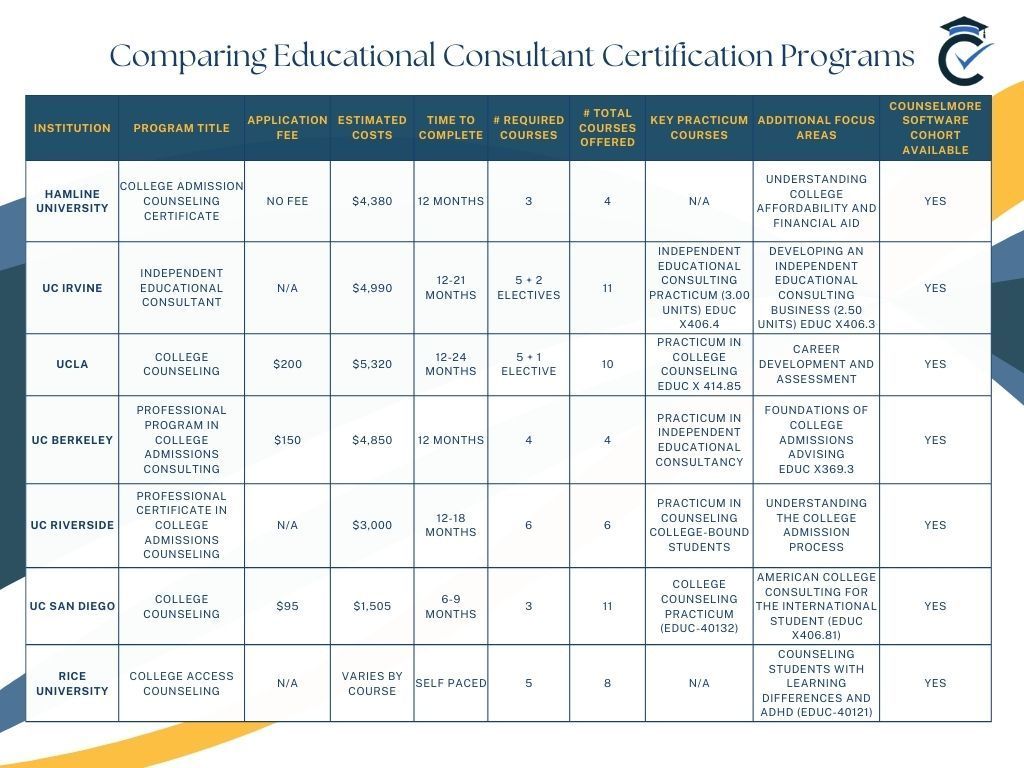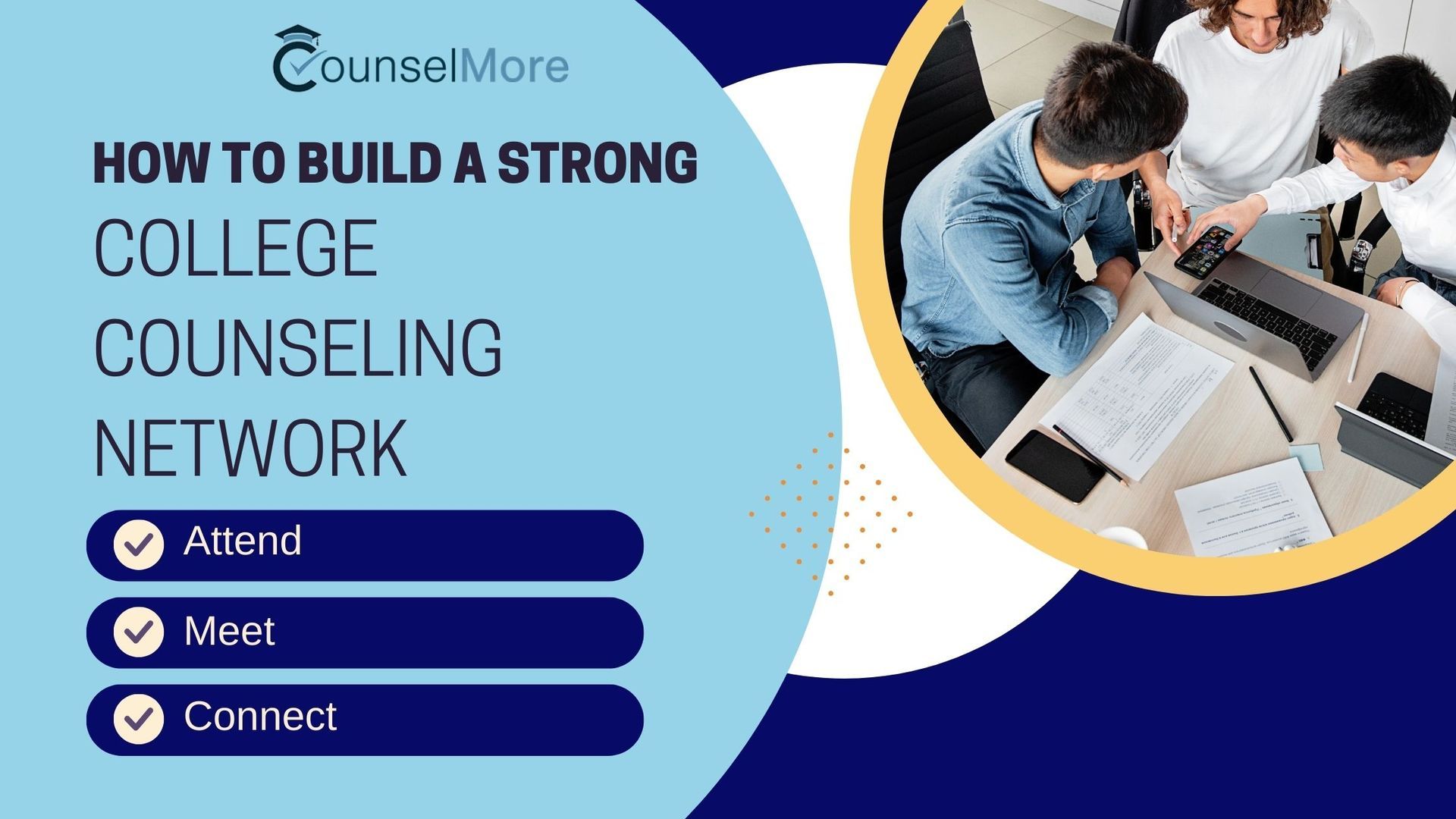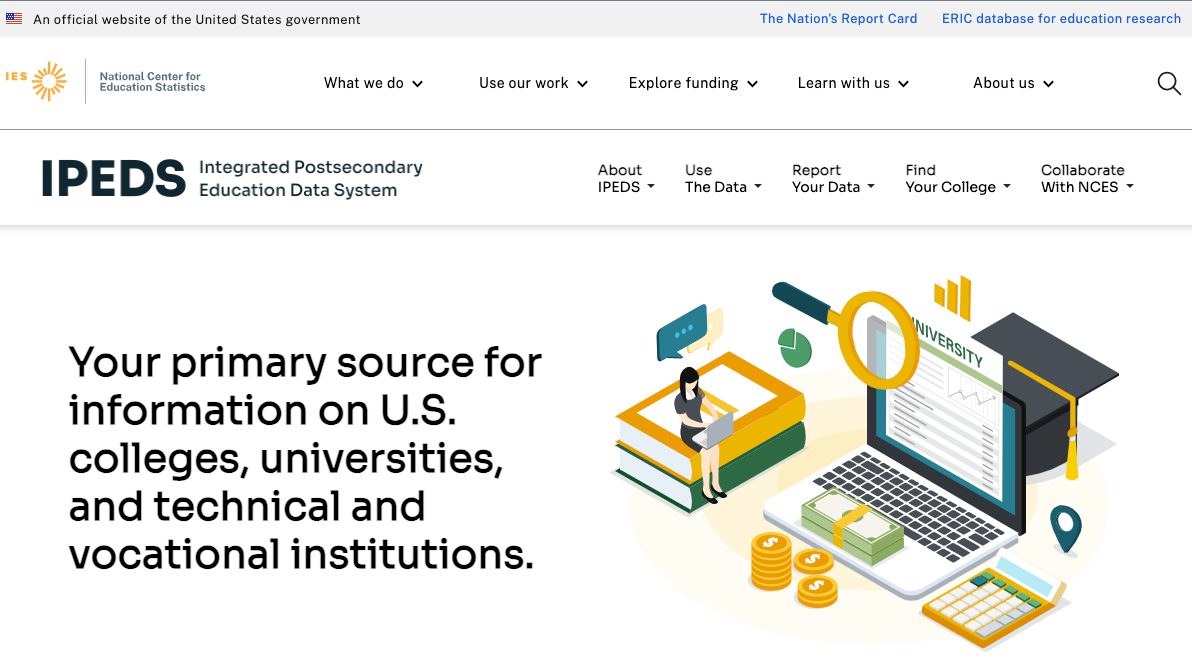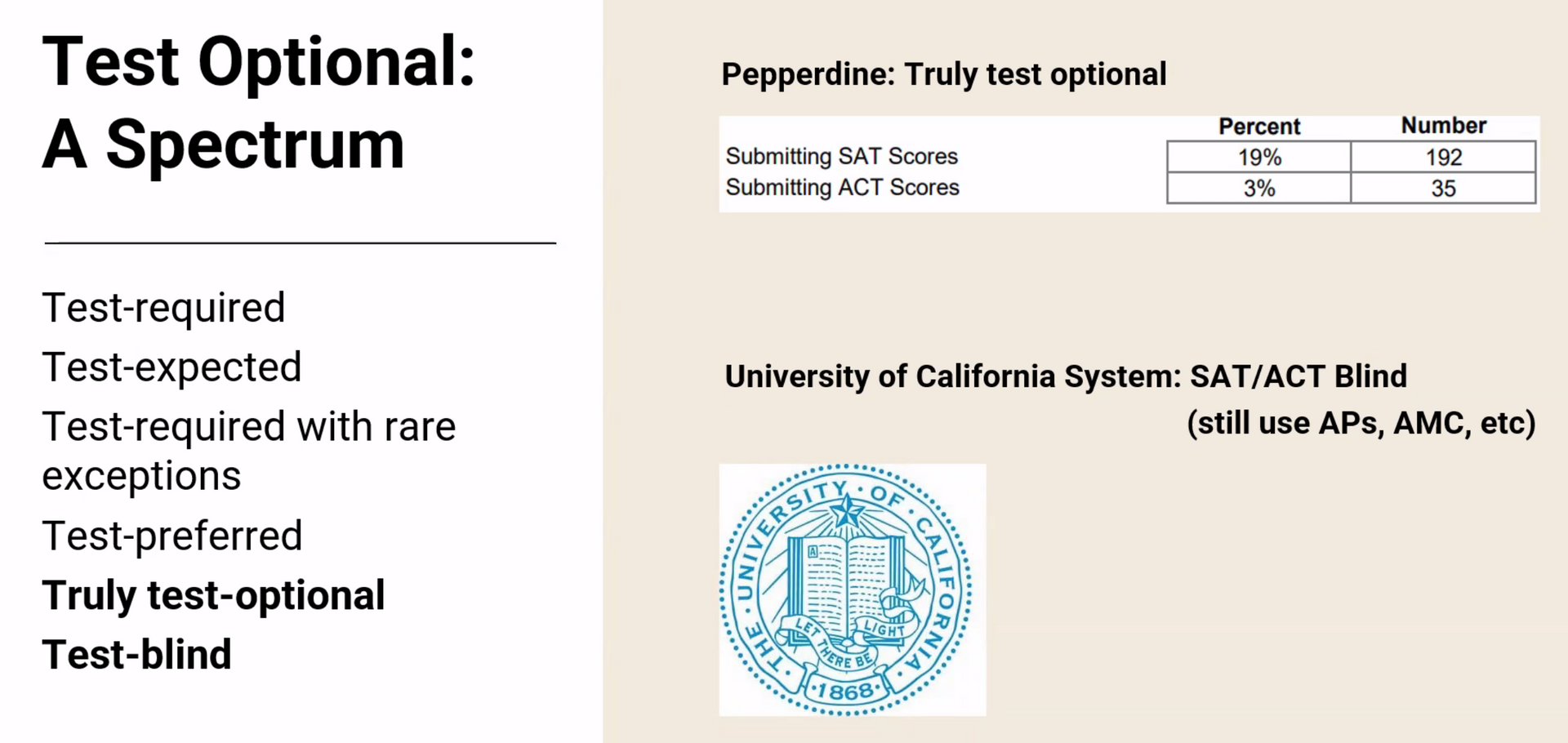Do Educational Consultants Need a License? Comparing Educational Consultant Certification Programs: Course Offerings and Key Features

If you’re considering a continuing education program in educational consulting, college counseling, or advising, you’ll quickly encounter a wide range of program titles and formats. The rapid expansion of the educational consulting field over the last decade has led many universities and adult education centers to develop specialized professional training and certificate programs. It makes sense that these institutions would seek to shape the professionals guiding students through their admissions processes, as most private educational consultants focus on creating application lists, managing deadlines, and supporting candidates through every aspect of college applications. Additionally, many consultants, academic advisors, and private college planners (who go by various titles) have broadened their services to encompass college and career readiness. This holistic approach includes guiding students in course selection, preparing for higher education academics, nurturing their interests, and building well-rounded profiles for competitive college admissions.
Unlike a Master’s degree in higher education studies, these certification programs are well-suited for individuals with existing degrees who are exploring a new career path. They offer practical skills, industry insights, and a confidence boost to help professionals transition smoothly into educational consulting.
As you evaluate different programs, it’s crucial to compare them based on cost, time commitment, coursework, and hands-on training. To help, we’ve compiled a comprehensive comparison grid featuring well-regarded certification programs from institutions like Hamline University, UC Irvine, UCLA, UC Riverside, UC San Diego, and Rice University.
Our aim is to give you a clear picture of what each program offers, so you can choose the one that aligns best with your career goals and educational aspirations.
Key Insights from the Comparison
Cost Differences Across Programs:
The estimated costs of these programs range significantly, with UC San Diego offering one of the most budget-friendly options at approximately $1,505, while UCLA's program is on the higher end at $5,320. Prospective students should evaluate their budget and weigh the program's cost against potential outcomes and benefits.
Program Duration Variability:
Program lengths differ greatly, from the shorter, self-paced option at Rice University and UC San Diego’s 6-9 month program, to UCLA’s more extended timeline of up to 24 months. This flexibility in time commitment allows prospective enrollees to choose a program that aligns with their current professional and personal responsibilities.
Practicum and Hands-On Experience:
While all programs emphasize educational consulting or counseling, not all include a dedicated practicum. Programs like UC Irvine and UC Riverside specifically integrate practical experience through practicum courses, offering hands-on skills that may better prepare graduates for the field.
Course Structure and Required Courses:
The number of required courses varies significantly, with some programs offering as few as three core courses (Hamline University) and others requiring five or more with elective options (UC Irvine). Those interested in a more comprehensive or specialized curriculum may prefer programs with additional electives or requirements.
Specialized Focus Areas:
Several programs offer specialized focus areas tailored to the evolving needs of educational consulting. For example, UC Irvine focuses on developing independent consulting businesses, while UC San Diego provides coursework on American College Consulting for International Students. This added focus can be a key differentiator based on career goals.
Application Fees:
There is a wide range of application fees, from no cost at Hamline University to a $200 fee at UCLA. Potential applicants should factor these fees into their decision-making, especially if they plan to apply to multiple programs before choosing.
CounselMore Cohort Training Availability:
Each of these programs is recognized by CounselMore Educational Service Management Software as a thought-leader in our industry. CounselMore offers the option to join a CounselMore cohort training group, enabling members to learn alongside their classmates in a collaborative environment.
This cohort-based model offered through the
Educational Services Academy provides a sense of community, consistency in training, and the opportunity for shared learning experiences, enhancing the educational journey and professional growth for aspiring consultants.
Some of these programs offer a focus on entrepreneurial skills and business startup guidance for educational consultants.
Specifically:
- UC Irvine's Independent Educational Consultant Certificate Program includes a course titled Developing an Independent Educational Consulting Business (EDUC X406.3), which focuses on building and managing an independent consulting practice.
- UC Berkeley's Professional Program in College Admissions Consulting provides foundational knowledge in Foundations of College Admissions Advising, which can be helpful for those looking to establish their own consulting practice.
These elements can be highly beneficial for individuals seeking to start or grow their own educational consulting business. By combining practical knowledge with targeted entrepreneurial skills, these programs empower participants to navigate and thrive within this competitive field. This balance of educational expertise and business acumen offers a solid foundation for building a successful consulting practice.
While these university-run certificate programs often excel in delivering an academic understanding of educational consulting, running a solo entrepreneurial educational services startup poses unique challenges that go beyond foundational knowledge.
Growing a business, especially in its early stages, requires not only technical and industry knowledge but also hands-on guidance and the ability to adapt to market demands. During critical growth periods, having access to mentorship and practical insights can make a significant difference in the trajectory of a consulting business.
Even with a certificate in educational consulting or college counseling, an entrepreneur my feel unprepared and for those new to the practice, attending the Educational Services Training Academy offers distinct value that goes beyond the essentials in the certification programs. While certificates provide essential knowledge and skills, the academy is uniquely focused on delivering entrepreneurial business startup expertise specifically tailored for educational consultants. This specialized training in intangible-product development and diversifying revenue streams, for example - helps participants identify and refine their service offerings, building quickly, ensuring that service delivery costs are strategically outweighed by fees to maximize both revenue and sustainability.
The academy provides in-depth guidance, personalized support, and insider industry knowledge. This hands-on approach empowers participants to thrive, scale, and navigate the complexities of running their own businesses. By filling in the critical business-building gaps often overlooked in traditional certification programs, the Educational Services Training Academy equips participants with the tools and strategies needed to build successful, scalable consulting practices.
Conclusion
Selecting the right educational consultant certification program depends on several factors, including cost, duration, course offerings, and the specific skills you want to develop. Whether you are seeking a program that is short and cost-effective or one that provides in-depth specialization and practical experience, the above comparison can help guide your decision.
For more detailed information about each program, you can visit their respective websites:
Hamline University https://www.hamline.edu
UC Irvine https://ce.uci.edu
UCLA https://www.uclaextension.edu
UC Riverside https://extension.ucr.edu
UC San Diego https://extension.ucsd.edu
Rice University https://glasscock.rice.edu
Explore these options to find the program that best aligns with your career goals in the field of educational consulting!
Update:
SUNY Oneonta, C.A.S. School Counseling


















